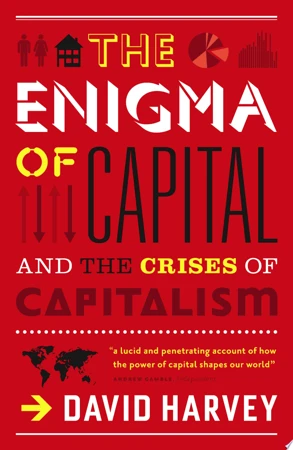The Enigma of Capital – And the Crises of Capitalism

Blurb
For three centuries the capitalist system has shaped western society, informed its rulers, and conditioned the lives of its people. Has the time come to move beyond it?
Using his unrivalled knowledge of the subject, Harvey lays bare the follies of the international financial system, looking at the nature of capitalism, how it works and why sometimes it doesn't. He examines the vast flows of money that surge round the world in daily volumes well in excess of the sum of all its economies. He looks at the cycles of boom and bust in the world's housing and stock markets and shows that periodic episodes of meltdown are not only inevitable in the capitalist system but essential to its survival. The Enigma of Capital is a timely call-to-arms for the end of the capitalism, and makes a compelling case for a new social order that would allow us to live within a system that could be responsible, just and humane
Book summary
In his 2010 published book “The Enigma of Capital and the Crises of Capitalism” multi-talented US geographer, anthropologist and Marxist economist David Harvey aims to analyse the capitalist system that has shaped western society and the globalized world of today. Harvey outlines metaphorically in his preamble that understanding capital flows is at the core for this analysis: “Capital is the lifeblood that flows through the body politic of those societies we call capitalist” (p.vi). In specific he looks at the surplus capital of the capitalist class. While this is looking for profitable investment to accumulate even more capital it results in contradictions and detrimental effects on human and nature. Finally, as a geographer, Harvey introduces a historical geographical theory of the evolution of capitalism.
Comment from our editors:
Generally, this book brings a very focal and important criticism of mainstream economics, which I agree with, to the debate. It is that at the very core of in orthodox theory there existed a false presumptive assumption about capitalism and crisis, which contributed to the fatal ignoring of the analysis of crises prior the Global Financial Crisis.
Harvey quotes a former chief economist of the International Monetary Fund (even though without the reference provided it is not clear who exactly) as “we sort of know vaguely what systemic risk is and what factors might relate to it. But to argue that it is a well-developed science at this point is overstating the fact” (p.261). Yet, disruptions and destruction to which humanity is exposed need to be better understood for us to do something about it. While mainstream economics is looking at e.g. externalities of the market mechanism, Harvey, in an understandable and metaphorical way, looks at these disruptions as the core of the argument and the capitalistic system.
His (mostly) dialectical argumentation and theory on capital itself, crises, and the long-term evolution of capitalism is in my view an important contribution to post-crisis literature. Especially his geographic mapping approach which is ‘heads on‘ to the ceteris paribus fixation of mainstream economics is highly valuable.

